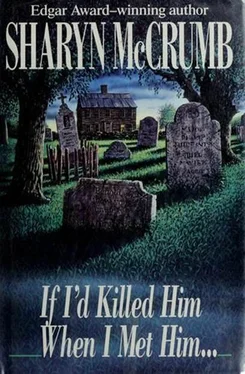‘You can’t very well petition for a marriage when the bride is dead,’ Edith pointed out. “Unless you’re really going to expand the concept of civil rights.”
“No, no,” said Bill. “I meant the case about whether or not Porky is a person. I was mapping out an argument to free him-”
“I think you’d better drop the entire matter, Bill,” said A. P. Hill. “In the best interests of the dolphin.”
“Why?”
“Think about it. Do you really want to prove that Porky is a person after he’s been involved in the death of Miri Malone? As an animal he has no rights or responsibilities, and he can’t be held liable for his actions. But what if you make the court rule that he is a person, and then they charge him with murder?” She shrugged. “I can’t believe we’re having this conversation.”
“Fish jails,” murmured Edith. “That would be expensive.”
“You’re right,” said Bill. “Miri wouldn’t want Porky to suffer for her death. Maybe we should just leave things as they are.”
“Had Miss Malone paid you?” asked A. P. Hill.
“Not yet. I hadn’t billed her.”
“In that case, partner, the matter is closed.”
Several months later A. P. Hill had her day in court with Eleanor Royden. Powell had tried to balance her instinctive defense attorney’s delaying tactics against the need for a speedy trial to minimize the damage done by Eleanor’s relentless press conferences. “I’d rather defend O. J. Simpson,” she said in a moment of desperation. She hadn’t meant it, though. She was only tired, and exasperated, and above all frightened that her best wouldn’t be good enough to save Eleanor Royden.
The trial lasted the better part of a week- neither side had the funds or the patience for a lengthier battle. Eleanor was vilified by the prosecution as a bloodthirsty shrew who murdered her victims out of spite. A. P. Hill retaliated by presenting the Roydens as a selfish, shallow couple who delighted in tormenting Jeb’s ex-wife. Witnesses described the same incidents from opposite points of view: he was a monster; she was a monster. It all depended on whom the witness identified with, or, in the cases of some of the middle-aged women, it depended on whom the witness was afraid to be identified with. Some affluent wives apparently thought that Eleanor should be belled and cowled like a leper. She was dangerous: she threatened the well-being of all of them. A few courageous souls (most of whom were divorced) hailed Eleanor as a terrible prophet of feminism, who could single-handedly stem the tide of trophy wives and midlifecrisis divorces, but most people treated the case as a bad joke-nothing that need have any bearing on their lives.
Now all the hours of testimony, the psychiatric evaluations, and the media circus surrounding the trial had wound down to one focal point: a spotlight on A. P. Hill for the defense. She looked more pale and waiflike than ever in her navy-blue suit and sensible low-heeled pumps; her hair chopped into a straight bob covering her ears; and her lip gloss smeared on in haste, after she had finished throwing up in the courthouse ladies’ room. She looked as insubstantial as a pond reflection beside her client. Eleanor Royden’s newly tinted blonde hair shone like a helmet in an upswept coiffure, and her black silk dress reminded no one of bereavement. Perhaps its solemnity was marred by its low neckline and the diamond necklace at her throat. Eleanor’s makeup was vivid, and reapplied at short intervals, in case a photographer should be aiming at her with a telephoto lens. She had watched the entire proceedings with bright-eyed interest, and a cheery briskness that suggested that this was someone else’s trial. Perhaps it was A. P. Hill’s. She was growing thinner by the day as the circles under her eyes deepened.
Eleanor sometimes smiled at the jurors, or nodded in sympathetic agreement with the judge’s ruling, but A. P. Hill remained impassive, as if her life, not Eleanor’s, depended on the verdict. Now she tottered to the front of the courtroom to begin her summation. The jurors were watching her, expressionless, while Eleanor gave her a grinning thumbs-up sign that almost sent her back to the ladies’ room.
A. P. Hill took a deep breath and began. “I’m here to defend Eleanor Royden, not necessarily to praise her. I hope that Jeb and Eleanor Royden do not become the symbolic middle-class couple of the Nineties, because as a nation we deserve better role models than these two shallow, selfish, alienated creatures. But I do think they should have stayed together-because they deserved each other.
“The prosecution has gone to great pains to show you how heartless Eleanor Royden was to have shot her husband and his new wife while they slept, and of course I can’t stand up here and say that anybody, any victim, deserves to die, but…” She paused here, and shook her head. “I’d have to say that Jeb and Staci came close.
“The legal community here in Roanoke knew Jeb Royden as a capable attorney, a good friend, and a community leader. They all told you what a nice guy he was-and so he was-among his equals. But there was another side to Jeb Royden that his colleagues, his fellow officers of the court, never saw: Jeb the bully; Jeb the adolescent, addicted to self-gratification; Jeb the domestic tyrant, whose arrogance knew no bounds.
“Jeb Royden made a lot of money. He thought that made him important-certainly more important than fluffy blonde Eleanor, whose very food and clothing came from his bounty. He thought he was entitled to have his own way in all things because he was the one who mattered. Eleanor didn’t matter. She was just another one of Jeb Royden’s possessions, as bought and paid for as his sports car. And as replaceable.
“For much of their lives, Eleanor Royden had acquiesced in her husband’s delusions of grandeur. She let him have his own way. Sometimes that’s the easiest way to keep peace with a tyrant, but in the end it costs you, because tyrants feed on people who let them have their own way all the time. They take it for granted.
“Imagine Jeb’s surprise when he wanted a new toy, and insignificant old Eleanor said no. He had the palatial house in Chambord Oaks, and the midlife sports car, and all the money he needed, and now he wanted the trophy: a new young wife- the hormonal equivalent of a face-lift, I guess. And Eleanor said no.
“How dared she? Wasn’t he the rich and important attorney? Didn’t he deserve the best of everything? He could certainly afford it. Eleanor had tried to thwart the mighty Jeb Royden, and he thought she deserved to be punished for it.
“His indifference toward an aging and no-longer-beautiful wife turned to hatred for an enemy. He began to use his legal skills, his power and influence, as weapons to turn his divorce into a chess game. He would make Eleanor suffer for her presumption. The tragedy is that he began to enjoy tormenting her.
“Jeb Royden forgot that it is dangerous to torment the weak. They have nothing to lose.” A. P. Hill noticed a movement in the back of the crowded courtroom. She saw her partner slip into the last row of seats. A. P. Hill felt ridiculously glad to see him. He had driven all the way up from Danville just to give her moral support. No one could help her now, but she was grateful to see someone who was on her side. She couldn’t smile at Bill now; she would thank him later.
A. P. Hill turned away and picked up where she had left off: “You’ve been told in detail all the things that were done to punish Eleanor Royden for the sin of not going away quietly. She was arrested for trespassing; the furniture she had chosen for their home was given away so that she should have none of it; she was ridiculed in front of her former friends, and made to live in poverty by a man with a high-six-figure income, while he continued to live in his usual splendor. And through it all Jeb and Staci Royden laughed at Eleanor. They made fun of her. You saw a check he wrote her, on which he put: for upkeep of cow . That cow was Jeb Royden’s wife of twenty years, the woman he had promised to love for better or for worse.
Читать дальше












